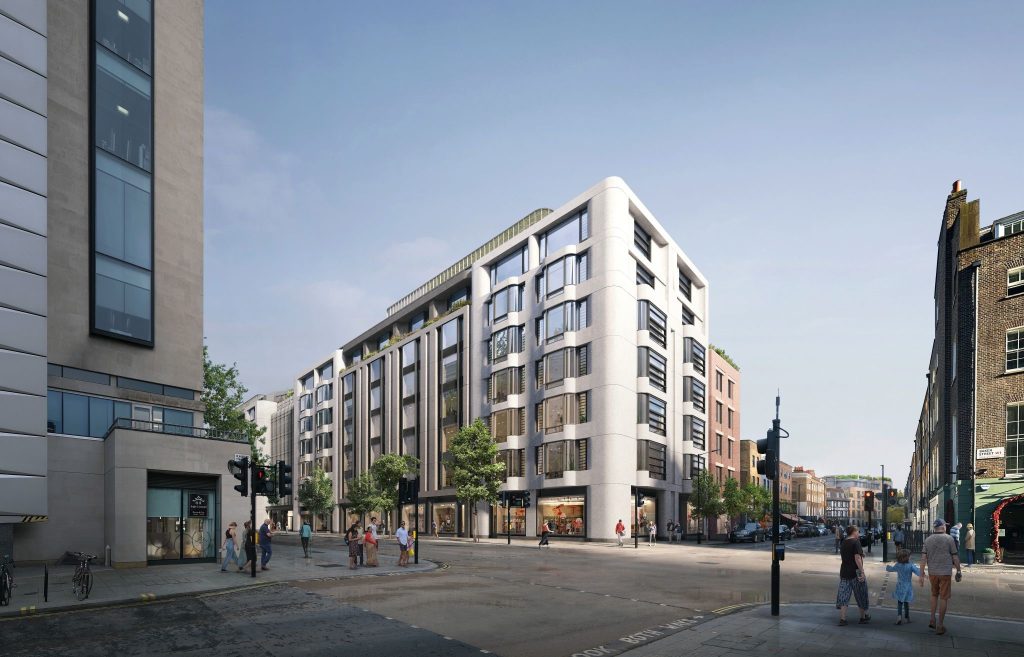
Written by Simon Gartshore
The recent consent for the replacement of 38 to 70 Baker Street, granted at Westminster’s Major Applications Committee in early August, represents the most significant demolition scheme approved since Labour won control of the council in May 2022.
Working on behalf of Derwent London and Lazari Investments, Kanda were able to draw on over 20 years’ experience in the borough, leading the consultation and engagement, utilising our knowledge of the local landscape, engaging extensively, creatively and closely with representatives, stakeholders, residents, business and community groups in the area – and the decision offers a number of learning points on how to work with the authority.
Retrofit first – but it doesn’t have to mean retrofit only
In a borough which is avowedly and publicly ‘retrofit-first’, and with Cllr Barraclough as the Cabinet Member responsible for the policy sat in the front row of the public gallery observing the committee, the plans were subject to some of the most detailed scrutiny and assessment of carbon optioneering of any scheme in the borough. This ultimately concluded that four of the buildings occupying the northern half of the site were effectively obsolete – but that the 1970s concrete-framed Accurist House presented the most significant challenge in justifying a replacement.
However, the assessments – and peer reviews – confirmed that the embodied carbon required to strengthen the retained structure and bring it within the redevelopment would have been greater than replacing it – meaning the replacement option was preferable to a deep-retrofit on this occasion. And also meant there was no requirement for carbon payback graphs.
Kanda worked with the project team, including Gerald Eve and AHMM architects, to present this clearly and transparently to a range of audiences, explaining the basis of the assessment and that the conclusions had been independently verified.
All of which came before the improvements to the ongoing operational carbon and performance of the building, which could only be delivered through a new-build scheme, were also taken into account.
Targeted benefits matter
The public benefits of the proposals – in needing to meet the extremely high bar to replace buildings in the borough and outweigh the harm being caused by the increased massing and to address local concerns, were also closely scrutinised by decision-makers.
The team worked widely to establish and shape the most far-reaching benefits package of any scheme determined in recent years, with Kanda working with groups to help shape the benefits and ensure these aligned with the priorities of the council as much as possible.
These benefits included:
- Replacing the buildings with a new, net zero carbon, flexible and energy-efficient development.
- Introducing a modern naturally ventilated building using low-carbon materials, significantly reducing ongoing carbon emissions in its operation and benefit from extensive urban greening. This included the re-use of a significant amount of the existing materials on the site.
- Creating 1500 jobs, employment and training opportunities in the Central Activities Zone – aligning with the Labour narrative of supporting economic growth.
- Providing a new, purpose-built flexible educational, cultural and leisure hub on-site at a peppercorn rent in perpetuity; working with the Baker Street Quarter Partnership to design and curate a programme of activities for the hub to bring it to life and drive social value in the local area.
- Delivering 17 new homes on the site and supporting the delivery of 23 new affordable homes at Castle Lane in Victoria via housing credits – the equivalent of 50% affordable housing. This would see more units, also delivered five years earlier, than would have been delivered on-site.
- Establishing a partnership with a local school to install new photovoltaic panels onto their roof, reducing their operational costs, and help to address the carbon offset requirement for the development – creating a win-win for all parties.
- Learning from the history of the area, by working closely with the Special Forces Club, who had sponsored a City Council green plaque at 64 Baker Street to commemorate Marylebone’s close association with the Special Operations Executive (SOE) in World War Two. This will see the reintroduction of the green plaque on the new building, a permanent exhibition of the work of the SOE and an accompanying learning programme.
Good Consultation Matters
Easy to say, but difficult to achieve at such a sensitive site located in the Central Activities Zone, but which is adjacent to long-standing residents, listed buildings and the Portman Estate Conservation Area.
The team set and then lived the principles of being open and transparent throughout their engagement activities, commencing with early engagement on the existing site, principles and opportunities – and looking to take on feedback wherever possible through an extended series of workshops and exhibitions as the plans evolved over a 2.5 year period.
By genuinely listening and working in partnership, we achieved a number of revisions and improvements to the scheme, from reducing and consolidating servicing vehicle movements along Broadstone Place, to ensuring Broadstone Place remains a quiet oasis for residential neighbours, to shaping the community space, celebrating the connection to the SOE, managing the operation and access to external areas in the future, and revisions to the height and bulk.
Ultimately, some local concerns remained about the height and bulk – but the dialogue remained open and respectful, reducing the number of issues which the committee would need to consider. And could be presented as such, with a shared commitment from all parties to retaining dialogue regardless of the decision at committee.
Conclusion
The bar to securing permission on major sites, particularly when needing to replace buildings, nonetheless remains a high one in the borough. The Committee diligently scrutinises all elements of the officers’ assessment and recommendations, not being afraid to challenge or disagree along the way before coming to a balanced decision, often on an individual basis.
But with a commitment to genuine, meaningful and far-reaching engagement – being prepared to work with the City Council and its retrofit-first approach, and accepting that benefits need to be greater and more demonstrable if replacing buildings, a significant milestone was achieved for the project.
Ultimately, every borough in which Kanda works is very different in terms of policy and their focus. However, with extensive experience of working successfully in every London borough, including over two decades of experience in Westminster, we ensure that our clients present and consult on proposals which genuinely align and cater to borough-specific priorities – and seek to secure positive outcomes for all.
To find out more about Kanda please email info@kandaconsulting.co.uk or call 0203 900 3676.
